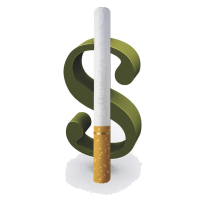California Helps Wall Street Pocket 44% of Landmark Tobacco Settlement

The 1998 landmark $245-billion settlement with tobacco companies to help pay for health-care costs caused by their cancerous products was supposed to provide states with an ongoing stream of cash for at least 25 years and probably longer.
And it has—just not nearly as much as for taxpayers as originally indicated and a lot for Wall Street, according to a series of reports by ProPublica.
An analysis by the nonprofit investigative news organization found that 44% of the $100 billion paid out so far has ended up in the hands of bankers, who provided states (and in the case of California and New York, cities and counties) with quick cash up front in exchange for securitized bonds sporting healthy interest rates.
California, 24 counties and the city of San Diego securitized at least a portion of their winnings for cash now, which was then often spent on projects unrelated to smoking or health care. California gets about 12.5% of the all the national settlement money.
The state independent Legislative Analyst’s Office projected in 2002 that California would receive $21 billion over 25 years. Half that money was earmarked for the 58 counties and Los Angeles, San Francisco, San Diego and San Jose. The payouts from tobacco companies were tied, to some extent, to the health of the companies and the sales of their products.
Government entities justified securitization of their payouts, in part, by claiming it gave them a steadier stream of revenue for planning purposes.
One California exception is San Bernardino County, which receives $17 million to $24 million a year and never securitized. The county spends its money on public health programs and paying down the debt for a medical center.
The original agreement made no stipulation how the money would be spent and ProPublica found that the most common use nationally was to pay off old debts.
Tobacco bonds are very popular on Wall Street, regarded as much for their uncertainties as their huge rewards, perhaps because in chaos there is opportunity. A December 2012 settlement between 17 states and the tobacco companies ended a dispute regarding wording of the original deal and the size of their payouts.
Bill Black, a manager of the Invesco High Yield Municipal Fund, was delighted. “What's fun about tobacco bonds is it's a never-ending story,” Black told the Wall Street Journal.. “You're always looking for the next thing to try and figure out what's going on.”
Some entities tried to max out their cash by having Wall Street leverage it, selling securities for them known as capital appreciation bonds (CABs). California State Treasurer Bill Lockyer likened CAB’s to payday loans, with their delayed payments, astronomical interest rates and catastrophic balloon payments, when he was blasting school districts for mortgaging their futures by using them.
California is already struggling to pay about $3.7 billion for the $350.5 million worth of CABs it sold in 2007.
“They’re doomed,” California State University, San Bernardino finance professor Jim Estes told ProPublica. He said the question of default on the CABs was “not a question of whether or not, it’s a question of when.”
“Hopefully it doesn’t come to the point of default because this office would be concerned about a negative fallout in the market,” Locker spokesman Tom Dresslar said.
And that’s no fun.
–Ken Broder
To Learn More:
Investors Haul in Nearly Half the Tobacco Settlement Cash (by Cezary Podkul and Claire Kelloway, ProPublica)
How Wall Street Tobacco Deals Left States with Billions in Toxic Debt (by Cezary Podkul, ProPublica)
California Tobacco Bond Sale a Hit with Investors (by Mike Cherney, Wall Street Journal)
Tobacco Securitization―Bond Issuance in California (California State Treasurer) (pdf)
Annual Report of the California County Tobacco Securitization Agency (pdf)
- Top Stories
- Controversies
- Where is the Money Going?
- California and the Nation
- Appointments and Resignations
- Unusual News
- Latest News
- California Forbids U.S. Immigration Agents from Pretending to be Police
- California Lawmakers Urged to Strip “Self-Dealing” Tax Board of Its Duties
- Big Oil’s Grip on California
- Santa Cruz Police See Homeland Security Betrayal in Use of Gang Roundup as Cover for Immigration Raid
- Oil Companies Face Deadline to Stop Polluting California Groundwater





